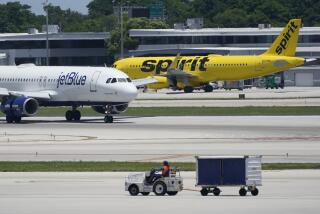Europe Panel Rejects Boeing Merger Plan
- Share via
PARIS — A panel of European antitrust experts, shrugging off an opposing verdict from U.S. authorities, recommended Friday that the $14-billion marriage of Boeing Co. and McDonnell Douglas Corp. be blocked on grounds that the American aerospace mega-merger, as it now stands, would harm fair trade.
The group’s unanimous finding, which is not the final word by the European Union, leaves open the door to new negotiations. One EU official said the advisory panel, made up of one expert from each of the trade bloc’s 15 member countries, decided that proposals made by Boeing this week to modify its takeover plan are insufficient to prevent it from gaining too large a chunk of the commercial airliner market.
Observers were not surprised by the Brussels-based panel’s recommendation, because European officials have been voicing their concerns for months about the takeover plan and the menace it poses for the two U.S. companies’ European competitor.
Boeing now holds 65% or so of the worldwide market for large commercial jetliners of more than 100 seats, compared with a 30% share for Airbus, a European consortium. The merger with McDonnell Douglas would push Boeing’s share up to 70%.
The EU antitrust advisory committee said the merger would reinforce Boeing’s “existent dominant position and therefore should be prohibited.”
In contrast, the Federal Trade Commission on Tuesday approved the takeover by a 4-1 vote, with the American agency ruling that it would not “substantially lessen competition in any relevant market.”
The EU cannot halt the merger. But under its laws, it can levy fines on Seattle-based Boeing if it finds that its takeover of McDonnell Douglas adversely affects free trade in Europe.
“I think Boeing and McDonnell cannot afford to ignore the commission, so there will probably now be a compromise,” Konstantinos Adamantopolous, a Brussels aviation lawyer, told the Bloomberg News Service.
In Seattle, a Boeing official said her company was disappointed with the EU committee’s position but would continue to work toward an acceptable agreement. “Understandably, we are disappointed, but we are committed to continuing to work with the European Commission to reach a positive outcome,” Boeing spokesman Sherry Nebel said. “We are optimistic that there is time to work out these issues.”
*
The European Commission, the EU’s highest executive authority, is scheduled to make a final ruling on Boeing’s plan July 23.
This week, Boeing reportedly told the commission that it was ready to modify controversial 20-year contracts with three U.S. airlines--American, Delta and Continental--so they are no longer bound to buy planes from Boeing alone.
The EU antitrust panel rejected those concessions as “not sufficient,” one European official said. European officials had already said the green light the FTC gave the merger was irrelevant to their ruling.
Debate over the Boeing-McDonnell Douglas union comes as many in Europe are worried about the future of their aviation, space and defense industries in the face of greater concentration on the other side of the Atlantic.
On Thursday, Lockheed Martin Corp. announced that it will buy Northrop Grumman Corp. for $11.6 billion, a deal that will leave just three major arms makers in the United States.
Some financial analysts predicted that the Europeans will trade approval for the Boeing merger for an American blessing to make changes in a 1992 U.S.-EU accord that places a ceiling on how much financial help governments can give airplane builders.
*
Europeans have long charged that the Pentagon contracts and research grants that Boeing and McDonnell Douglas obtain are indirect subsidies that help their civilian programs as well.
Airbus now is looking for at least $9 billion in development funds for a 600-seat superjumbo jet that would allow it to challenge Boeing’s lucrative monopoly in the 400-seat-and-up market.
Executives at Airbus--a consortium owned by Daimler-Benz of Germany, Aerospatiale of France, British Aerospace and Construcciones Aeronauticas of Spain--say the 33% ceiling on direct government loans for new airliner projects fixed by the 1992 agreement is too low.
The Boeing-McDonnell Douglas marriage would create a financial and technological giant, with more than $40 billion in annual sales, 200,000 employees and products ranging from the 747 jumbo jet, the F-15 and F-18 fighter jets and the Apache helicopter to a new international space station.
More to Read
Inside the business of entertainment
The Wide Shot brings you news, analysis and insights on everything from streaming wars to production — and what it all means for the future.
You may occasionally receive promotional content from the Los Angeles Times.










